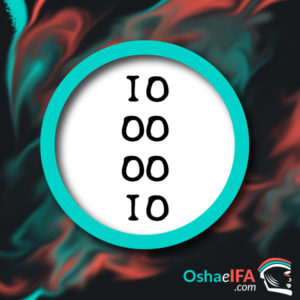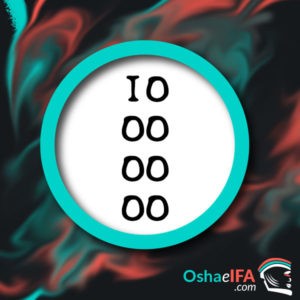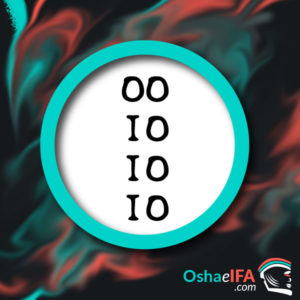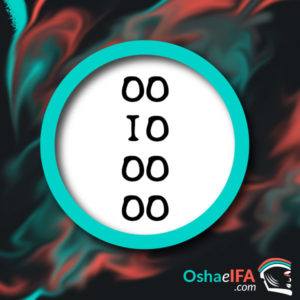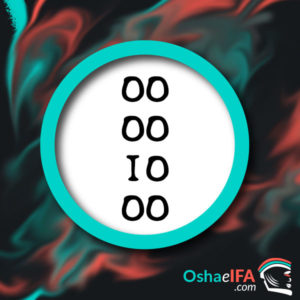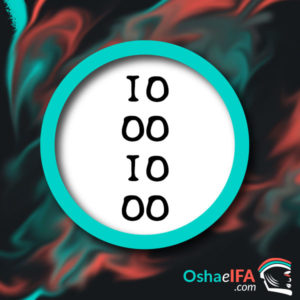Oyekun Ofun: Meaning, tips, sayings, patakies and more

Oyekun Ofun, is the combination between the Ojú Odù Oyeku and Ofun, is the Odu number 46 of the genealogy of Ifa, Orunmila wishes this person to be well. Life will favor you, but you must be careful around a man and his antics. This person's children should never be presumed to their parents.
Oyekun Berdura He recommends that we make the necessary sacrifices as well as corrections in our behavior so that we can avoid premature death.
Other names of the Odu Oyekun Ofun:
Oyekun Berdura.
In the odu Oyekun Berdura was born:
- Born: Eshu Larufa.
- Give Eshu black chicken.
- The Transfiguration of the Lands and Eshu.
- The determination of the Guardian Angel by Orúnmila.
- The consecration slaughter of Osha is carried out by the Awoses.
- Shangó handed over the Power of the Kingdom to Orúnmila.
- The Jimaguas have luck, health and money.
- Eshu is given mouse.
- You don't eat ram.
- The lagoon is fed.
- The lagoons are the heads of the rivers.
- Oyekun Ofun brand tummy tie.
- Here: It was where Oshún bought servants.
- Suddenly marks death.
- It is an Ifá of Lagoons.
- People are transformed into homosexuals (Adodi or Alakuata).
- Drink destroys in this Odu.
Description of the odu Oyekun Berdura:
In this Odu, Eshu Larufa was born, who is the son of Inle and Ikú, and from a very young age he saw the great powers that his Parents had. He is a doll that is made of carved wood with two bodies, one male and one female, and is planted in a clay pot where his secret goes.
This Eshu eats black hen, as follows:
You will need: 1 black hen, a rooster, jutía and smoked fish, corojo butter, toasted corn, 2 candles and coconut.
The following athena will be painted on the pan: Oshe Turá, Oyeku Ofun and Otura Oshe.
+ + +
IIOOII
OOIOOO
IIOOII
OIIOIO
Eshu is placed on an osun of Elegua, with eleven lines on the floor. He is given coconut (Obi Omi Tutu), giving him an account of what is to be done.
A shaved coconut is taken, to which the same Athena of the casserole is painted. He stands next to Eshu.
The black hen is taken and killed, first adding the blood to the coconut, then it is raised to Eshu and given to Athena from the pot and then it is placed on the blood again. And a rooster is given.
He is given coconut to see how he received everything and is asked what to do with the animals.
In Oyekun Berdura, the transfiguration of the Earth and of the people was born, where they can become Adodi or Alakuata, since they have the power to have both sexes, so you have to be careful with the children of this sign and problems of corruption.
Here Shango He gave power to Orúnmila and the Jimaguas gave him luck, health and money.
You can read: Ifa Ofun Yemilo sign
Oyekun Ofun Recommendations:
- For this Odu he is given a mouse, as well as a smoked mouse to overcome difficulties.
- For this Ifá, half the money from the Ebó is given to Eshu and the other half is for the Awó; if it is for the Awó, ceremonies are performed.
- By the sign of Ifá Oyekun Ofun, one does not eat ram. The lagoon is fed. This Ifá marks belly tie.
- Here the body is taken from the dead. Eshu is given two coconuts and given a small goat.
- This was where Oshún bought servants.
- In Oyekun Berdura, Ebo is made with a horse or horsehair.
- Brand: sudden death.
- Pregnant women are Ebo with a dirty cloth from their customs so that they do not have an abortion, because the baby is in a bad place. Ebó: 1 rooster, dirty cloth from his customs, new cloth, colored ribbons, hutía and smoked fish, toasted corn, candle, coconut, a lot of money.
- Here he does not ride a horse because he can spoil an old man and it will be his own death.
- It is not crossed by bushes so as not to pick up the bad.
- With a güiro you put a piece of mouse and you put on Eshu and with that you get a woman.
- Glass of Tuna and Sábila is taken.
- Here he is given two chickens, one white and one black, then he gives it to his
- Ifá, first the white one and then the black one.
What does the sign of Ifa Oyekun Berdura talk about?
Ifá is given two gourds, one Chinese and the other Creole.
When this Ifá is seen, that day Orúnmila is given five pieces of bread -akará- with hutía and smoked fish and five cents, and that same day it is taken to the cemetery.
Here the Awó is cleaned with beef bofe, tied with a purple ribbon and hung on a tree.
For this Ifá (Oyekun Berdura), five pieces of bread -akará- are always marked and from them pieces are taken to be thrown into the Ebó. Afterwards, corojo butter is spread on them and jutía and smoked fish are embedded in them, and they are put directly to OSHUN and before 24 hours they are taken to the cemetery, on the outside, never inside.
Here the woman is married to a Babalawo so that she can be happy and content.
For this Ifá, the person has cried a lot.
You have to be careful with operations, do Ebó so that nothing happens to you.
Here you have to be careful with the injections because they can become encyst.
The woman has to take care of the marriage, because they can surprise her in something bad.
The Ebó of the Oyekun Berdura sign go to the Lagoon.
Here the drink destroys the owner of this Odu.
Here Eshu is fed in the corner so that he can develop.
Meaning of Oddun Oyekun Ofun
Here it was born that both the determination of the Guardian Angel and the slaughter of consecrations of Osha did the Babalawo.
Here the son lives with a trauma from having seen the parents performing the sexual act.
In Oyekun Berdura is where the children are given virtues so that they can grow up free from harm and so that the respect between father and children lasts.
When this Odu comes out, if the person is going to have a child, sacrifices must be made to avoid aborting or losing the pregnancy.
When this Odu comes out in divination for a woman she should be warned that she should not abandon her husband so that she is not used by others, as was Ewe Ebiba (Tamale Leaf).
When Oyekun Ofun goes out in divination for a man, he is warned not to rush into an adventure that is risky, much more if there are older people who compete. He will not win, but if he wants to go between them he must offer a goat to Eshu before starting to avoid sudden death.
When this sign appears in Igbodun, the person is warned that someone close to him will die suddenly and that he makes the greatest effort so that he does not die, if he does not perform the Ebó, do not go to his funeral or to see the body of the dead.
You must make a sacrifice to prevent the death of your friend before he gets home.
You can read: Odu of Ifa Oyekun Meji
Sayings of Oyekun Berdura:
- Don't leave the true for the doubtful.
- Notice given by a minor is often taken as a desperate recourse.
- When the brandy is spilled, it is when one realizes where it should have been.
Ifa Code of Ethics of the Sign Oyekun Ofun
Olofin gives the Awó the power to defeat his enemies.
Says Ifa odu Oyekun Berdura
That you do not go to see the sick or to wakes; In her house there is a pregnant woman who has a cloth and some rags with blood inside a basket, she has to bring it to pray for her so that when she goes to give birth, the doctor does not have to perform an operation and have to remove the child, which She will already be dead, and she can die too. she has a daughter who will have to marry her to a Babalawo, she has four lovers and she does not accept any, until she meets a Babalawo. You have to receive the news
suddenly dead.
They have to tell you about a sick person, do not go to see him because there may be a change of mind. You have to deal with people in good standing. You cannot ride a horse so that you do not spoil it and so that you do not spoil another person. Ebo has to do with the mane of a horse.
You can eat mutton. You have to find a woman with the means to live, who will be your wife. You have to attend to Eshu a lot. You cannot cross through the jungle to avoid picking up the bad.
He saw his Parents in the sexual act and is traumatized. You have to be careful with drinking because it can cost you your life.
Prayer of the Odu Oyekun Berdura:
OYEKU BEDURA MAFUN ABA BARABA MAFUN ABA
OFUN MAYEKUN FUN YANSAN LELE FOIGUERO MALELE
OYEKU FUN MAFUN YEKU BERERE ORI OSHUN MORI YEYEO
MOLAYARI IYALODE MORI YEYEO AGBEYAMI LELE OSHUN
MUST OKANA YELEGUE YELELE OYEKU FUN YEYEBI OYA
OMA YIRE AWO BODAWA AWO OBA ERI IFA KAFEREFUN LORI
IFA MAFEREFUN ESHU LARUFA.
Suyere of the Odu Oyekun Ofun
OFUN MINI ADEYANO
OFUN MINI ADEYANO
ADIFAFUN OGUN ORUN LERI
ADIFAFUN OSUN ORUN LERI
OFUN MINI ADEYANO
Oyekun Ofun's Ebbo:
Inshe Osanyin for man.
Take a green banana and put it to dry in the sun. It becomes dust; Roasted peanut powder, tiger hair, ero, obi, kolá, osun, obi motiwao, aira, orogbo, Anun, hutía and smoked fish are made, corojo butter, cocoa butter, husk, honey, brandy, earth of the house, land of work, land of shoes, dried blood of the animal that has caught.
Before assembling, the powdered ingredients are fed from the animal he caught, along with whatever Osha. It is wrapped in cloth of the ritual color of the Osha or the Guardian Angel of the person concerned.
Oyekun Berdura's work Against enemies
An egg is taken, emptied and loaded with: paper ashes with the enemy's names, hutía and smoked fish, corojo butter, toasted corn, chicken foot grass, brandy; he stands at Eshu's foot and is asked if he eats with him, rooster, chicken or pigeon.
Patakie of the sign Oyekun Ofun:
HISTORY ESHU LARUFA
PRAYER: OYEKU BEDURA MAFUN AGBA BARAGBA MAFUN AGBA OFUN MAYE KUN YANZA LELE FOGUERO MALELE OYEKU FUN MAFUN YEKU BERERE ORI OSHUN MORI YEYEO AYERI IYALODE MORI YEYEO AGBEYAMI LELE OSHUN SHOULD
OKANA YELEGUE YELELE OYEKU FUN YEYEBI OYA OMAYIRE AWO BODAWA AWO OBA ERI IFA KAFEREFUN LORI IFA
Kaferefun Eshu Larufa.
EBO: 1 rooster, 1 black hen, 9 pieces of bread, 5 cents, honey, cane syrup, coconut, yams, candles, many necklaces, 3 crowns, jutía and smoked fish, corojo butter, toasted corn, a lot money.
History.
On this path Eshu Larufa was the son of Iku and Inle. And since childhood he saw the great powers that his father Inle had, because when he went to talk to Iku, he prayed to him:
"ODARA LELE IKU OFUN KAYEKUN FUN EWEYE BEIFUN IKU YEKU OKUADA LAYEBE IKU MAFUN INLE ABELORUN EWEYE BEIKU FUN MAFUN IKU".
And, at the moment, Ikú was transformed into a shadow that no one saw and everyone who met on his way was taken away, and thus she arrived before INLE.
He sang to him and he too was transformed.
This was the suyere:
«SAWA LELEYE AWA IKU EGUN SAWA LELEYE ADIE INLE AWA IKU EGUN ESHU LARUFA AWA NI LORUN»
Ikú sang that to him, with a black hen in his hand and began to dance with Inle, believing that his son was sleeping, but Eshu Larufa watched them and he, who saw all those things, lived very disgusted because he had no power to be able to do the same as their Parents did.
When Ikú went to sleep, Inle would put a dry coconut as a pillow for him to rest, because Ikú doesn't sleep, he only rests; and for Inle it was that Ikú slept. Eshu Larufa said to himself: - «So many virtues that my parents and I have without any», for which he lived bitterly.
Eshu Larufa also saw that, when her mother Ikú was going to leave, she would give the dried coconut to Inle and tell him to bury it and thus see how she transformed into different colors and each transformation of hers had a different virtue for the World.
Iku also told him: "Never, not even to your son, will you be able to say anything about this."
Eshu Larufa asked his father Inle for permission to go out for a walk. He authorized it and Eshu Larufa went out to visit the Belele Land, where Oya lived.
He got there very sad and worried, and he told the Orisha Oyá everything he knew about his parents. Oya replied: - «I am going to bathe you with some Omiero de yerbas, which will serve as a scouring pad». And he bathed it with Omiero of fine grass, canutillo, guengueré, ero, obi, kolá, and he sang: «ESHU LARUFA OMO LERI AWA IKU ORI LERI AWA IKU ESHU LARUFA OMO LERI AWA IKU».
Later, Oyá gave him a coconut and a black hen, and told him: - «When you return to your house, without anyone seeing you, you change to your Father Inle the hen with which he dances with your Mother and he also changes him the coconut that he puts
as a pillow to sleep and you bring me everything right away ».
When Eshu Larufa returned to Oyá with what she had ordered, she kept him in her house for three days and, at the end of the same, she took the black hen and gave the blood to Eshu Larufa and she also ate; He took the secret out of the coconut and gave it to Eshu Larufa, and said to him: - «Come with me». And they both went to where Inle and Ikú were.
When Iku began to tell Inle, he saw how his son Eshu Larufa transformed into two figures, one of a man and one of a woman. Iku was scared and asked Inle: -Have you noticed the transformation that takes place in the body of our son Eshu Larufa? Oyá jumped and gave three cries, and Inle and Ikú threw themselves to the ground. And Oyá told them: -"Children are given virtues to
May they live free of prejudice and so that the respect between parents and children will last, and you, Inle, will have to respect your son Eshu Larufa ». To. Were going. Eshu
Eshu Larufa, with the help of Oyá, became great on Earth.
Note: Here the son lives with a trauma from having seen the Parents performing the sexual act.
ESHU OF THE ODU OYEKUN OFUN.
Eshu Larufa:
This Eshu is the son of Inle and Ikú. It is a doll carved in wood, with two bodies glued on the back. One of a naked man, with well defined genitalia; the other body of a naked woman, with her breasts.
This carving is cemented in a clay pot where the secret goes. The heads are loaded with: obi motiwao, ero, obi, kolá, osun naború, aira, anun, orogbo, jutía and smoked fish, corojo butter, toasted corn, cocoa butter, husk, brandy, honey, earth of Cemetery, from the hill, from Bibijagua, from the four corners, land of crabs, sand from the sea and from the river, beads from all the Oshas, chicken leg grass, beads, get up, Iyefá prayed by Oyeku Bedura, gold, silver, copper, limayas of different metals, amber, jet, earth tomb of a child.
When the doll is loaded and washed with Omiero of Eshu and Elegba herbs, it is taken together with the clay pot to a bush with four pieces of coconuts, with a guinea pepper each, a small stone from the base of a hill each one, a black hen, a whole dried coconut, brandy, honey, four pieces of coconut to ask, a
gourd with water.
The casserole is placed at the foot of the hill and inside the four pieces of coconut are placed with them and the small stones on top of the coconuts (these pieces of coconuts with the shell). The doll stands inside the pot. He is given coconut (Obi, Omi, Tutu) and the hen is sacrificed to him, singing:
“ESHU LARUFA OMO LERI AWA IKU OBI LERI AWA IKU ESHU LARUFA OMO LERI OBA IKU”
The head of the hen is thrown into the clay pot and the body is left at the foot of the hill.
The clay pot is carried with its load and it is cemented so that the doll remains standing in the middle of the clay pot. The corresponding blade with ORUNMILA's feathers and beads is placed on the holes of each head. Then, on each neck, a necklace of white, black, red beads and shells (dilogunes) is placed.
Loading the casserole:
Strong sticks powder, guinea and marigold pepper, peonies, black hen's head, coconut, chicken egg, pigeon egg, lands of all positions, grass powder, beef, obi, ero, kolá, osun naború, scorpion, cat's eye.
Note: The cat is given to Osanyin first.
Oyekun Ofun Ifa Traditional
ÒYÈKÚ ÒFUN
Pékótókótó Awo Olórìí
A day fún Èèyàn
Èèyàn tíí will be Ìpín lórun
Wón ní kó fi isu rubo
Ó bá rbo
Oníkálukú bá n nisu lára
Ayée won n dára
Ifá pé okàn eléyìun or balè
Pékótókótó Awo Olórìí
A day fún Èèyàn tíí serú Ìpín lórun
Ebo n won ni or se
Èèyàn gbébo nbè
Ó rubo
Ìyànnyán
E wá wosé Ìpín se
Ìyànnyán
Ìpín mò n lájé
Ìyànnyán
E wá wosé Ìpín se
Ìyànnyán
Ìpín yes n láya
Ìyànnyán
E wá wosé Ìpín se
Ìyànnyán
Ìpín yes bímo
Ìyànnyán
E wá wosé Ìpín se
Ìyànnyán
Gbogbo ire patá nìpín n ní o
Ìyànnyán
E wá wosé Ìpín se
Ìyànnyán.
This person should offer 16 yam tubers. The Babaláwo must scrape the yam shell over the sacrifice.
He made divination to Human Beings
Humans are slaves of fate in heaven
They advised them to offer yams as a sacrifice
They did it
Every human being began to have muscles
their lives got better
Ifa says that this person will have peace of mind
Pékótókótó Awo Olórìí
He made divination to Human Beings
Humans are slaves of fate in heaven
They advised them to perform the sacrifice
Humans heard about the sacrifice
And they did it
Ìyànnyán
Come see the work of destiny
Ìyànnyán
Fate has wealth
Ìyànnyán
Come see the work of destiny
Ìyànnyán
Fate has a wife
Ìyànnyán
Come see the work of destiny
Ìyànnyán
Fate has children too
Ìyànnyán
Come see the work of destiny
Ìyànnyán
Fate has all the good things in life
Ìyànnyán
Come see the destination work
Ìyànnyán.
You can read:



